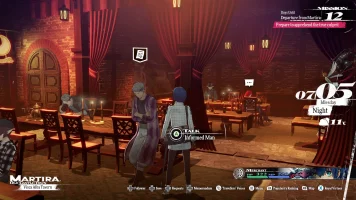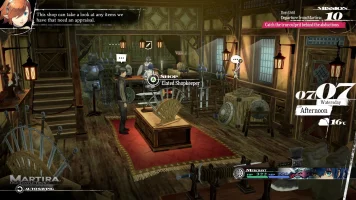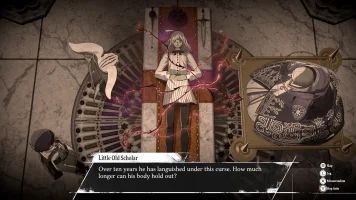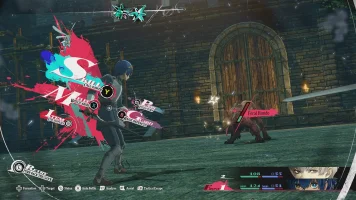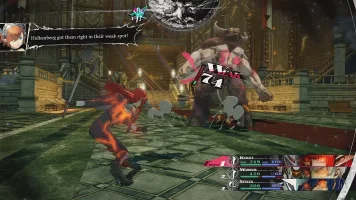General Information
In this PC game review, we'll take a closer look at what makes Metaphor: ReFantazio stand out from the crowd. We'll explore its captivating fantasy world, examine its refined gameplay systems, and delve into its stunning audiovisual presentation. By the end, you'll have a clear picture of why this game is being hailed as a new benchmark for JRPGs and whether it's worth adding to your gaming library.
A Captivating Fantasy World
The Kingdom of Euchronia
Metaphor: ReFantazio takes place in the United Kingdom of Euchronia, a medieval fantasy realm that serves as a mirror to our modern world. This captivating setting is home to eight distinct tribes, each with its own unique characteristics and social standing. The kingdom is characterized by its wealth and technological progress, but it's also plagued by intense divisions and increasing attacks from mysterious creatures known as Humans.Euchronia's landscape is as diverse as its inhabitants, featuring a range of terrains from bustling port towns and ancient castle streets to secluded island villages. This variety not only adds depth to the game's visual presentation but also plays a crucial role in shaping the gameplay experience. As players traverse these different locales, they'll encounter unique activities and challenges that help build the protagonist's virtues, a stat system reminiscent of the Persona series.
Themes of inequality and politics
At the heart of Metaphor: ReFantazio's narrative lies a complex web of political intrigue and social inequality. The game begins with the assassination of King Hythlodaeus V by General Louis Guiabern, plunging the kingdom into chaos. This event sets the stage for a unique electoral system, where a magical force allows citizens to select their next ruler based on popularity.This political backdrop serves as a canvas for exploring themes of corruption, societal complacency, and the flaws of modern electoral systems. Players will find themselves navigating a landscape where potential rulers and nobles exert their influence to control the outcome of the political campaign. The game draws parallels to the themes found in Persona 5, but with a fresh twist set in a medieval fantasy world.
The political themes in Metaphor: ReFantazio are not just window dressing. They're deeply woven into the fabric of the game's world and mechanics. Players will need to build political support from around the land, mirroring the struggle against societal complacency from a medieval kingdom's perspective. This approach allows the game to offer a unique dissection of political races, free from the baggage of real-world political affiliations.
Unique races and social dynamics
One of the most intriguing aspects of Euchronia is its diverse population of tribes. Each tribe has its own distinct culture, traditions, and stereotypes that play into their perceived roles in society. This tribal system serves as a powerful allegory for real-world prejudices and injustices.Among the tribes are the religious Mustari, whose unorthodox beliefs make them outcasts, and the emotional Paripus, fox-like people shunned for their open display of feelings. Only two tribes enjoy privileged status, including the one that runs the country. This hierarchy creates a rich tapestry of social dynamics for players to navigate.
The protagonist belongs to the Elda tribe, a group that suffers from severe discrimination due to their magical abilities. As an Elda, the protagonist faces constant prejudice and ostracism, providing players with a firsthand experience of the kingdom's social inequalities. This perspective serves as a powerful lens through which players can explore the game's themes of acceptance and overcoming prejudice.
Magic plays a crucial role in shaping Euchronia's social structure. Interestingly, magic use is tied to wealth, with only those who can afford magical tools having access to this power. This creates another layer of class division within the game's world, further emphasizing the political and social themes at play.
As players journey through Euchronia, they'll have the opportunity to interact with NPCs from various tribes, each interaction shedding light on the complex social fabric of the kingdom. These encounters will not only advance the story but also provide valuable insights into the world's cultures and conflicts, making the kingdom of Euchronia feel alive and deeply nuanced.
Refined Gameplay Systems
Metaphor: ReFantazio brings a fresh take on traditional JRPG mechanics, blending familiar elements with innovative features to create a unique and engaging gameplay experience.
Enhanced turn-based combat
The game adopts the Press Turn system from the Shin Megami Tensei series, adding depth and strategy to battles. Each party member gets a turn icon, and hitting enemy weaknesses or landing critical hits consumes only half a turn. This encourages players to exploit vulnerabilities for maximum efficiency. Passing a turn to another ally uses just half an icon, allowing for tactical flexibility.Metaphor: ReFantazio introduces a mix of real-time and turn-based combat. Before entering a turn-based battle, players can engage enemies in real-time, aiming to break their gage. This results in free damage and stuns enemies, giving players an advantage when the turn-based phase begins. For lower-level encounters, players can defeat enemies entirely in real-time, streamlining the experience.
The game also incorporates a formation system, where characters can be placed in front or back rows. Front-row characters deal more damage with melee and physical attacks but are more vulnerable. Back-row characters excel at magic and have better survivability. This adds an extra layer of strategy, allowing players to optimize their party setup based on character strengths and enemy types.
Flexible Archetype system
Archetypes in Metaphor: ReFantazio function similarly to Personas or job classes in other RPGs. They determine a character's abilities, affinities, and stats. Unlike many other games, archetypes aren't limited to the protagonist – any party member can switch archetypes outside of combat, offering unprecedented flexibility in party composition.The game features 14 base archetypes, each evolving into Adept or Elite forms as players progress, resulting in a total of 40 distinct archetypes. This variety allows for deep customization and experimentation with different party setups.
Skill inheritance adds another layer of customization. Players can transfer skills between archetypes, further enhancing character versatility. Additionally, certain archetype combinations unlock powerful synthesis skills, which are particularly useful in challenging boss encounters.
Weapon choice plays a crucial role in combat effectiveness. Unlike previous Atlus titles where weapon stats primarily affected melee attacks, in Metaphor: ReFantazio, both physical and magical skills depend significantly on weapon attack power. This makes frequent weapon upgrades essential for maintaining combat effectiveness throughout the game.
Time management and social links
Metaphor: ReFantazio incorporates a calendar system reminiscent of the Persona series, with day and night cycles influencing available activities. Players must balance their time between dungeon exploration, developing relationships with Followers (this game's version of Social Links), and improving Royal Virtues (social stats).Follower Bonds, the game's take on Social Links, allow players to learn more about their teammates and allies without advancing the main plot. These bonds unlock new powers, items, and shop discounts. Unlike previous Atlus games, the Bonds system in Metaphor: ReFantazio is more forgiving, with many events occurring automatically during the main story and fewer time-sensitive interactions.
Interestingly, players' dialog choices during Bond events don't affect the relationship's rank. Instead, correct answers grant Magla, a resource used to power up characters or sold for money. This system encourages players to engage with Bond events without the stress of potentially failing the interaction.
Royal Virtues play a crucial role in unlocking quests and progressing Follower relationships. For example, increasing the Wisdom virtue early in the game unlocks a special dungeon and allows players to purify weapons and armor at the church, providing significant gameplay advantages.
The game's time management system strikes a balance between the freedom to explore and the pressure of deadlines for major plot points. While juggling dungeons, social stats, and companion relationships under time constraints can be stressful, it's a hallmark of Atlus games that adds depth and replay value to the experience.
Stunning Audiovisual Presentation
Art style and graphics
Metaphor: ReFantazio boasts a captivating visual style that blends cell-shaded characters with an almost oil painting and pastel approach to character portraits during dialogs. This unique artistic choice perfectly suits the game's time period and setting. The attention to detail extends beyond the main characters, with even background NPCs receiving more intricate designs compared to previous Atlus titles. This addresses a common criticism of Persona 5, which featured faceless NPCs.The game's menus are a testament to the developers' commitment to style. Vibrant and eye-catching, they invite players to explore different options with their dynamic designs. While menus might seem like a minor aspect, considering the significant amount of time players spend navigating them, the effort put into making them an integral part of the game's esthetic is commendable.
However, it's worth noting that the game's performance doesn't always match its visual fidelity. Built on the Persona engine, Metaphor: ReFantazio sometimes struggles with aliasing and shimmer, particularly noticeable due to the high-contrast art style and outline shaders. This issue is more pronounced on console versions, where the lack of anti-aliasing becomes apparent.
Music and sound design
The soundtrack of Metaphor: ReFantazio, composed by the prolific Atlus composer Shoji Meguro, has been a topic of discussion among fans and critics alike. While some have criticized it for being unmemorable, a closer look reveals a thoughtful and intentional approach to the game's score.Unlike the funky, poppy soundtracks of Persona games, Metaphor: ReFantazio's music is tailored to its fantasy setting. The score features epic trumpet-heavy battle themes that evoke scenes of civil war, reflecting the game's storyline. Choral tracks are used liberally, representing the voices of the oppressed people the protagonist strives to save.
Interestingly, the game incorporates a fictional language inspired by Esperanto in its vocal tracks, tying into the game's themes of unity and communication across diverse tribes. This unique approach adds depth to the musical experience and enhances the game's world-building.
The sound effects in Metaphor: ReFantazio deserve special mention. From the satisfying clicks in menus to the impactful sounds of attacks landing in battle, the SFX team has done an excellent job of adding weight and substance to every interaction in the game.
Voice acting and localization
Metaphor: ReFantazio features a talented English voice cast that brings the characters to life with a mix of English and Scottish accents. The voice acting adds depth to the characters, helping to convey nuanced emotions and personalities. For instance, the vocal performances help to make characters like Ann from Persona 5 more complex and relatable, adding layers to their initial impressions.However, compared to Persona 5 Royal, Metaphor: ReFantazio has noticeably less voice acting overall. Many social links and side quests lack voice acting, which can make it challenging for players to feel as connected to the characters during these interactions. This is particularly noticeable with some of the game's more eccentric characters, where the lack of vocal performance can cause some of the humor to fall flat.
Despite this limitation, the available voice acting is generally of high quality. The game offers both English and Japanese audio options, allowing players to choose their preferred language. While the English voice acting is good, some players might find the Japanese option more authentic to the game's style.
Conclusion
Metaphor: ReFantazio brings a fresh take on JRPGs, blending a captivating fantasy world with refined gameplay systems and stunning visuals. Its unique setting of Euchronia, with its diverse tribes and complex political landscape, provides a rich backdrop to explore themes of inequality and social dynamics. The game's innovative combat mechanics, flexible Archetype system, and thoughtful time management features offer depth and replayability that JRPG fans will appreciate.
While the game has its strengths, it's not without its drawbacks. The performance issues on some platforms and the reduced voice acting in certain sections might disappoint some players. However, these minor flaws don't overshadow the game's overall quality. With its engaging storyline, strategic gameplay, and beautiful audiovisual presentation, Metaphor: ReFantazio sets a new benchmark for JRPGs and is well worth checking out for fans of the genre.


